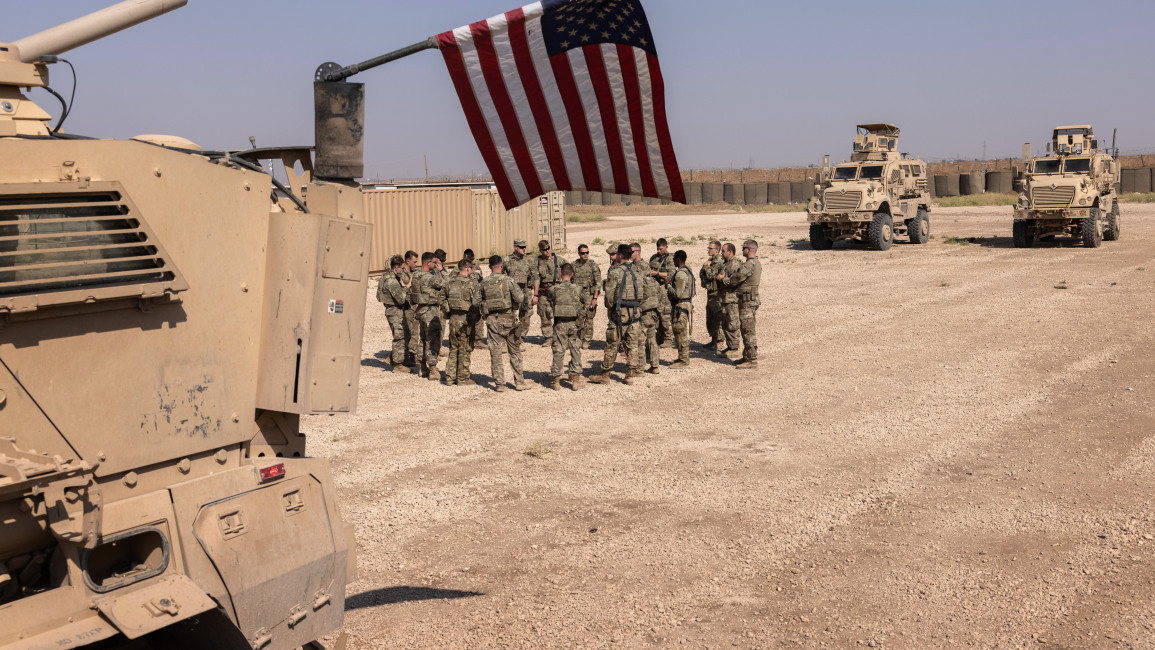Growing divide in Iraq on continued US military presence as Israel's war on Gaza persists
Various Iraqi political parties have exceedingly divergent views on whether foreign troops should withdraw from the country, with the divide cutting across sectarian lines.
Sunni and Kurdish political blocs prefer US and coalition forces to remain, while factions close to Iran are upping the pressure and calling for these forces to be expelled from the country and have also continued to target US and coalition forces within Iraq in response to Washington's backing of Israel's war on Gaza.
Akram Al-Kaabi, leader of the Iran-backed militia Harakat al-Nujaba, on 13 November, in a post on X, the social media platform previously known as Twitter, applauded the Iraqi Islamic Resistance for attacking Israel's Eilat with a suicide drone. He also threatened both Israel and the US that they "have more" and that "they will pay the price of their crimes in Gaza."
The Iraqi Islamic resistance has targeted US bases in Ain al-Assad, Harir in Iraqi Kurdistan, and the Tanf and Al-Malikiyah bases in Syria.
For its part, the United States says more than 45 attacks have occurred on its forces in Iraq and Syria since 17 October, which have wounded dozens of US personnel.
The United States carried out strikes against two Iran-linked sites in Syria on Sunday in response to attacks on American forces, Defence Secretary Lloyd Austin said.
"What is happening in Gaza constitutes crimes against humanity, genocide, and a blatant violation of all agreements and laws," Iraqi Prime Minister Mohammed Shia al-Sudani was quoted as saying in a release by his media office as he received a phone call from Dutch Prime Minister Mark Rutte discussing the developments in the Gaza Strip.
Al-Sudani also indicated that Iraq is making significant efforts to prevent the conflict from escalating, along with its commitment to protecting diplomatic missions and advisors present in Iraqi bases.
An advisor to the coalition forces in Iraq, speaking on condition of anonymity to The New Arab, said that almost all the Kurds and the Sunni political groups reject a complete withdrawal of the coalition forces in Iraq and that only some factions close to Iran want those forces to withdraw.
Meanwhile, on Monday, 13 November, Ahmed Al-Mousawi, a member of the Parliamentary Security and Defense Committee, told Iraqi local media that Sudani's cabinet must press for negotiations with Washington regarding Iraq's need only for foreign advisors for consultation, while the presence of armed military forces is entirely rejected.
He also added that a technical committee has been formed to negotiate with the US on this matter. If they agree to withdraw all military forces and retain only advisors, then an agreement should ensure the Iraqi resistance factions will not target them.
The United States has some 2,500 troops in Iraq to advise and assist local troops in combating IS, which proclaimed a 'caliphate' in the country following its meteoric rise in 2014.
The US-led coalition helped defeat IS in Iraq in 2017 and Syria two years later, but sleeper cells of the extremist group still carry out attacks in both countries.
Iraq's parliament, in March 2018, asked the Iraqi government to set a timeline for the withdrawal of foreign troops based in the country.
Saad Al-Saadi, head of the Parliamentary Rights Bloc, on 9 November, told Al-Sumaria Iraqi television channel that there are political motives behind the delay in implementing the decision by the parliament to withdraw US forces from Iraq.
He emphasised that there are threats from the US and Britain to bring Iraq back to Chapter VII of the United Nations.
"The exit of foreign forces from Iraq is an Iraqi popular demand… The Minister of Justice said this decision has not reached him to be publicised in the official gazette. The parliament confirmed its position on approving and signing it," Al-Saadi said.



